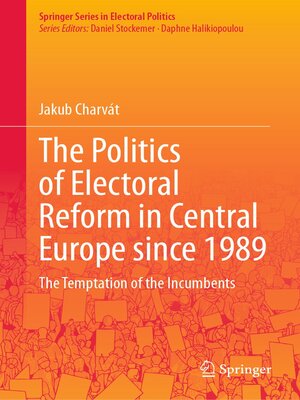The Politics of Electoral Reform in Central Europe since 1989
ebook ∣ The Temptation of the Incumbents · Springer Series in Electoral Politics
By Jakub Charvát

Sign up to save your library
With an OverDrive account, you can save your favorite libraries for at-a-glance information about availability. Find out more about OverDrive accounts.
Find this title in Libby, the library reading app by OverDrive.



Search for a digital library with this title
Title found at these libraries:
| Library Name | Distance |
|---|---|
| Loading... |
This book on the politics of electoral reform in Central Europe since 1989 explains by whom, why, and how the electoral rules were changed in Central Europe in the post-Communist period. Examining the contextual factors affecting, underlying, and/or initiating these changes, the book identifies main actors, their motivations, and other circumstances surrounding the electoral reform processes. It further explores their political consequences, particularly on proportionality and personalization.
Based on a detailed analysis of electoral reform processes in Czechoslovakia, Czechia, Hungary, and Slovakia over the past thirty years, the book discusses how the politics of electoral reform in Central Europe is mostly driven, controlled, and decided by politicians, with other actors being either overlooked or ignored. Finally, it argues that most of the cases were imposed by an elite majority, with the sole exception of the Czech Republic, where the politics of electoral reform were influenced by the intervention of the constitutional court as an external actor.
The book will appeal to students, researchers, and scholars of political science interested in a better understanding of electoral politics in general, as well as democratic transformation processes and electoral reform in Central Europe.
Based on a detailed analysis of electoral reform processes in Czechoslovakia, Czechia, Hungary, and Slovakia over the past thirty years, the book discusses how the politics of electoral reform in Central Europe is mostly driven, controlled, and decided by politicians, with other actors being either overlooked or ignored. Finally, it argues that most of the cases were imposed by an elite majority, with the sole exception of the Czech Republic, where the politics of electoral reform were influenced by the intervention of the constitutional court as an external actor.
The book will appeal to students, researchers, and scholars of political science interested in a better understanding of electoral politics in general, as well as democratic transformation processes and electoral reform in Central Europe.







